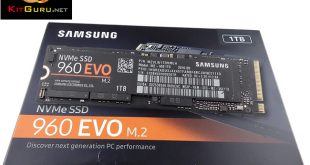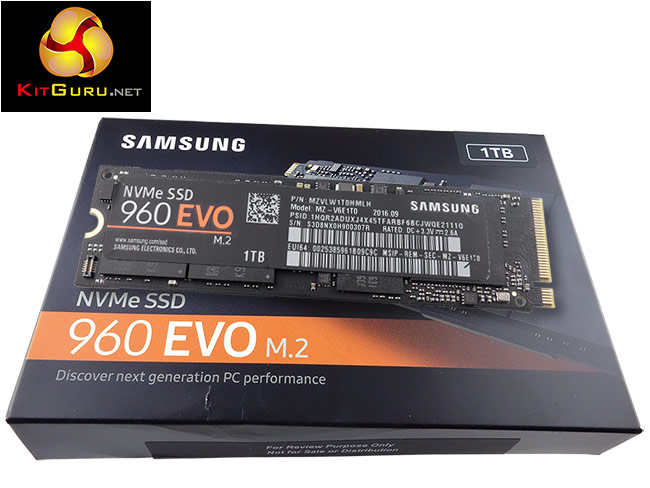
Announced at the same time as the high-end SSD 960 PRO, but arriving a month later, the newly-launched SSD 960 EVO is Samsung's attempt to push the M.2 PCIe NVMe format SSD into the mainstream market. The EVO uses the same Polaris controller as the 960 PRO but combines it with Samsung's 3rd Generation 48-layer 3-bit (TLC) V-NAND compared with the 2-bit MLC V-NAND used by the PRO.
The 960 EVO comes in three capacities; 250GB, 500GB and the flagship 1TB drive. Unlike the 960 PRO, the EVO doesn't use Samsung's 4-Landing or POP (Package-on-Package) design for the components on the PCB, with the controller, cache and NAND packages being laid out in a more conventional manner.
Samsung uses two types of their 3rd Generation 48-layer 3-bit TLC V-NAND for the EVO range. The 250GB model uses 128Gb dies while the 500GB and the 1TB models use 256Gb dies.
With the 960 EVO, Samsung have introduced Intelligent TurboWrite. First seen in the 840 EVO, TurboWrite accelerates write performance by creating an SLC write buffer (in the case of the 840 EVO this TurboWrite buffer was 3GB) in the drive. While a 3GB buffer was deemed adequate for a SATA drive, the higher performance/workload of an NVMe drive called for something a lot larger – enter Intelligent TurboWrite.
Intelligent TurboWrite identifies a workload and decides the appropriate SLC buffer to deal with it. For example, the 1TB drive has a default TurboWrite area of 6GB. Any data under that is dealt with in the TurboWrite region. However, what Intelligent TurboWrite brings to the table is the ability to use a dynamic SLC buffer for data that is larger than the default region; in the case of the 1TB drive that is up to 36GB giving a total SLC buffer of 42GB. This dynamic buffer takes advantage of any idle capacity but if the drive doesn't have more than the free capacity required, the Intelligent TurboWrite technology doesn't work.
Samsung quote Sequential performance figures for the drive at up to 3,200MB/s for reads and 1,900MB/s for writes. For 4K random performance, they quote two sets of figures. At a queue depth of 1 with 1 thread, the figures are up to 19,000IOPS for reads and 50,000 for writes. With a deeper queue depth of 32 and with 4 threads the figures rise to 380,000 IOPS for reads and 360,000 IOPS for writes.
The new updated version of Samsung's Magician software, which might have been expected to arrive with the 960 PRO, is now expected sometime towards the end of this month (November). What has been launched alongside the 960 EVO, however, is the latest Samsung NVMe driver (Driver 2.0) which should produce better performance than the native Windows drivers.
The 1TB drive has a quoted endurance of 400TBW and Samsung back the 960 EVO series with a three-year warranty.
Physical Specifications:
Usable Capacities: 250GB, 500GB, 1TB
NAND Components: Samsung 256Gb 48-layer 3-bit TLC V-NAND
Interface: PCIe 3.0 x4 NVMe
Form Factor: 2280 M.2
NAND Controller: Samsung Polaris
Dimensions: 80 x 22 x 2.38mm
Firmware Version: 1B7QCXE7
Be sure to check out our sponsors store EKWB here
 KitGuru KitGuru.net – Tech News | Hardware News | Hardware Reviews | IOS | Mobile | Gaming | Graphics Cards
KitGuru KitGuru.net – Tech News | Hardware News | Hardware Reviews | IOS | Mobile | Gaming | Graphics Cards



